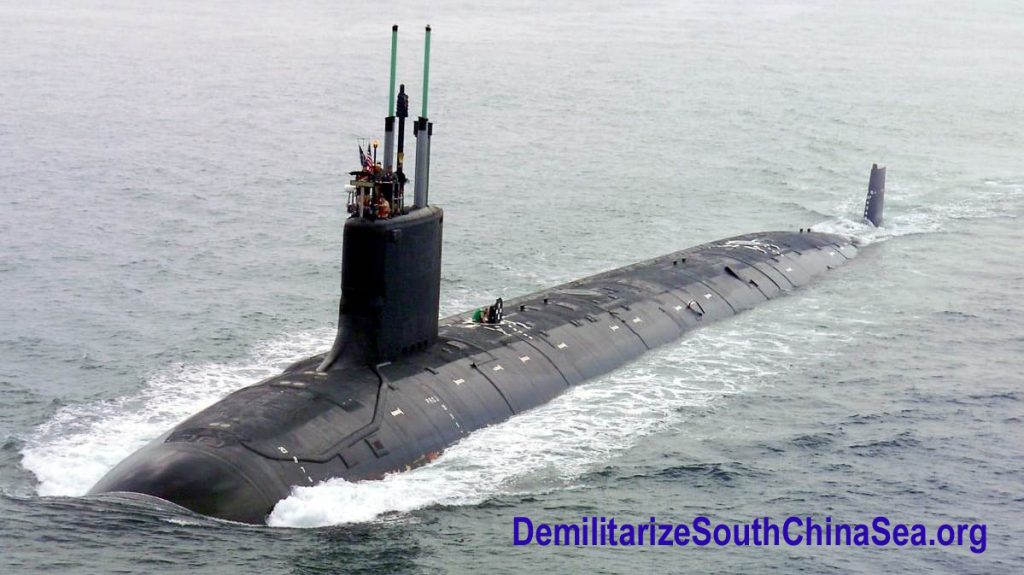Muhammad Zulfikar Rakhmat, Universitas Islam Indonesia (UII) Yogyakarta
A trilateral agreement between the US, UK and Australia on building nuclear-powered submarines, known as AUKUS, has raised criticism from various countries.
Many experts believe the agreement is part of a US strategy to suppress China’s domination in the Asia Pacific by equipping Australia, its ally in the region, with nuclear-powered submarines.
In response to the pact, China may drop its promise not to be the first to use nuclear weapons in a war, a former senior Chinese diplomat states.
Rejection also came from US ally France, after the agreement led Australia to cancel its 2016 contract with France to build 14 diesel-electric submarines worth US$40 billion.
However, no official statement has been issued by Southeast Asia’s multilateral body, the Association of Southeast Asian Nations (ASEAN), even though the agreement may have significant political impacts on the region.
ASEAN’s silence is not surprising due to the body’s non-intervention policy. However, we argue the silence is also fuelled by the split among ASEAN member countries with different views of China’s presence in the region.
Divided groups
The responses from ten countries in Southeast Asia to the AUKUS agreement vary. Some support the agreement, and some are against it.
The relationship between each country and China seems to have influenced these different stances.
The Philippines is in dispute with China over the Spratly Islands area in the South China Sea.
Although the Philippines has won an arbitration case after filing an objection to China’s claims on the island in 2016, China is still active around the area. Thus, supporting co-operation with the AUKUS alliance is an opportunity for the Philippines to stop China.
Philippine Foreign Minister Teodoro Locsin said Australia could improve its response to threats in the Southeast Asian region as a country close to ASEAN countries. The threat in question is the presence of hundreds of Chinese maritime militia ships in the Philippines’ exclusive economic zone.
Joining in the supporting group with the Philippines is Singapore, which hopes this trilateral alliance will be able to contribute to creating stability and peace in the region.
Likewise, Vietnam is believed to be accepting of the AUKUS pact, although it has not yet issued an official statement.
The group opposed to AUKUS includes Malaysia and Indonesia, regarded as the unofficial leader of ASEAN.
Indonesia’s rejection is likely to be influenced by its close relationship with China, which has intensified in various sectors, especially during the COVID-19 pandemic.
Indonesia cancelled a meeting with the Australian prime minister after AUKUS was announced.
The president of the Australian Institute of International Affairs, Allan Gyngell, explains how such rejection stems from Southeast Asian countries’ disapproval of an agreement that appears to send a message that they are powerless in maintaining their regional security, thus requiring the assistance of superpowers.
Malaysia has warned that this pact could trigger a nuclear arms race.
However, it is handling the issue delicately. Malaysia is consolidating with China to discuss Beijing’s response to AUKUS because it wants a balance of power between China and the US and its allies.
Despite its initial objections, Indonesia still seems to adhere to its free and active foreign policy, in which the country is prohibited from taking any side.
It has released five important points in responding to Australia’s plan to acquire nuclear submarines, calling on everyone to promote dialogue to resolve conflicts and differences, before resorting to nuclear power.
Indonesia also fears the possibility of a nuclear war in the region. This will lead to ASEAN losing its centrality with the South China Sea turning into an arena of conflict.
ASEAN’s non-interference policy
ASEAN’s silence also reflects business as usual for the organisational body.
In previous conflicts and incidents in the Southeast Asian region, ASEAN decided not to take sides and remained silent under its non-interference policy.
This happened during the case of Rohingya Muslims who are victims of discrimination and racism by the Myanmar government in Rakhine.
In addition, in early 2021, a coup by the Myanmar military overthrew Win Myint together with de facto leader Aung San Suu Kyi. In this case, ASEAN did not do much.
ASEAN’s has also adopted a similar attitude to democratic conflicts in Thailand between the military and citizens who demand constitutional changes and reform of the monarchy.
What ASEAN should do
ASEAN is facing a dilemma in its response to the AUKUS agreement.
On the one hand, it needs to find an alliance to maintain order in the region, and the never-ending South China Sea conflicts have made the task more challenging.
On the other hand, ASEAN needs to maintain relations with China to get economic benefits. Despite the global economic downturn, the value of ASEAN-China economic co-operation increased year-on-year by 7% to reach 2.93 trillion yuan or US$454 billion last year.
Not only that, China’s two-way investment increased by 58.8%, making ASEAN China’s largest trading partner.
However, ASEAN still has to raise its voice and respond to the AUKUS pact, realising how significant the agreement’s impacts would be for the region.
Meanwhile, Indonesia, as the key actor in ASEAN, should reconsider its free and active policy and be more proactive.
Looking at it from a different angle, the presence of AUKUS in the Indo-Pacific region may positively impact Indonesia and the region as a response to China’s increasingly aggressive manoeuvres in the South China Sea.
However, Indonesia still has to undertake careful consideration before making a move. But keeping silent is not a strategic option, both for ASEAN and Indonesia.
Yeta Purnama, a Universitas Islam Indonesia student, contributed to this article.![]()
Muhammad Zulfikar Rakhmat, Lecturer in International Relations, Universitas Islam Indonesia (UII) Yogyakarta
This article is republished from The Conversation under a Creative Commons license. Read the original article.
World News Headlines
Headline: Has violence toward women in USA dulled reaction to USA slaughter of Gaza women?
By Sharon Santiago, Fri, 20 Dec 2024 17:35:53 GMT

Headline: Opinion: Canada needs Prime Minister Trudeau for years to come. Here is why.
By Micheal John OBrien, Thu, 19 Dec 2024 06:24:36 GMT

Headline: U.S. Government complicity in Gender Based Violence crimes and WMD crimes
By Micheal John OBrien, Wed, 18 Dec 2024 23:50:01 GMT

Headline: Yoav Gallant, Benjamin Netanyahu should go to the Hague, turn themselves over to ICC
By Micheal John OBrien, Tue, 17 Dec 2024 07:26:20 GMT

Headline: World has leadership meltdowns, Canada too, on Trump tariffs.
By Micheal John OBrien, Mon, 16 Dec 2024 22:14:19 GMT

Headline: Zelenskyy-Biden refuse prisoner exchange, truce. Women say to soldiers, do truce anyway.
By Sharon Santiago, Sun, 15 Dec 2024 11:50:50 GMT

Headline: USA, Israel pursuit of Arab genocide, worse than we thought
By Rosa Yamamoto, Sat, 14 Dec 2024 18:10:28 GMT

Headline: Syrian diaspora needs to plan well for a home return, slowly, maybe wait
By Rosa Yamamoto, Thu, 12 Dec 2024 20:47:38 GMT

Headline: Biden, Netanyahu allied to the men who gave you 9-11
By Micheal John OBrien, Wed, 11 Dec 2024 18:22:02 GMT

Headline: Q. Americans ask, why are we so broke? A. You gave your $ to Ukraine, Israel
By Micheal John OBrien, Tue, 10 Dec 2024 20:25:47 GMT


